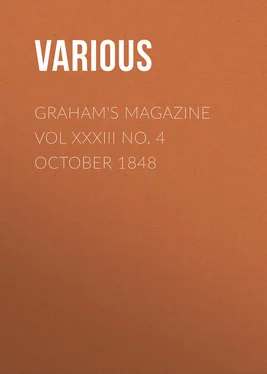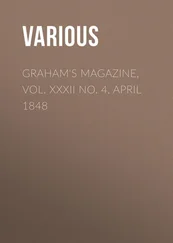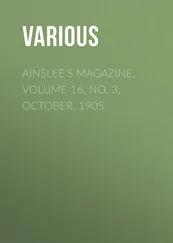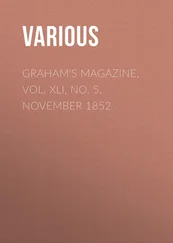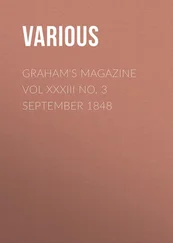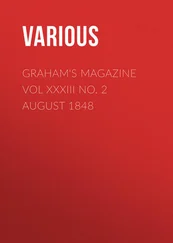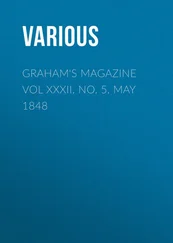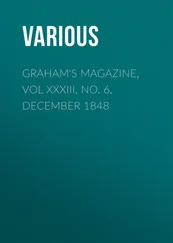Various - Graham's Magazine Vol XXXIII No. 4 October 1848
Здесь есть возможность читать онлайн «Various - Graham's Magazine Vol XXXIII No. 4 October 1848» — ознакомительный отрывок электронной книги совершенно бесплатно, а после прочтения отрывка купить полную версию. В некоторых случаях можно слушать аудио, скачать через торрент в формате fb2 и присутствует краткое содержание. Издательство: Иностранный паблик, Жанр: periodic, literature_19, foreign_edu, на английском языке. Описание произведения, (предисловие) а так же отзывы посетителей доступны на портале библиотеки ЛибКат.
- Название:Graham's Magazine Vol XXXIII No. 4 October 1848
- Автор:
- Издательство:Иностранный паблик
- Жанр:
- Год:неизвестен
- ISBN:нет данных
- Рейтинг книги:3 / 5. Голосов: 1
-
Избранное:Добавить в избранное
- Отзывы:
-
Ваша оценка:
- 60
- 1
- 2
- 3
- 4
- 5
Graham's Magazine Vol XXXIII No. 4 October 1848: краткое содержание, описание и аннотация
Предлагаем к чтению аннотацию, описание, краткое содержание или предисловие (зависит от того, что написал сам автор книги «Graham's Magazine Vol XXXIII No. 4 October 1848»). Если вы не нашли необходимую информацию о книге — напишите в комментариях, мы постараемся отыскать её.
Graham's Magazine Vol XXXIII No. 4 October 1848 — читать онлайн ознакомительный отрывок
Ниже представлен текст книги, разбитый по страницам. Система сохранения места последней прочитанной страницы, позволяет с удобством читать онлайн бесплатно книгу «Graham's Magazine Vol XXXIII No. 4 October 1848», без необходимости каждый раз заново искать на чём Вы остановились. Поставьте закладку, и сможете в любой момент перейти на страницу, на которой закончили чтение.
Интервал:
Закладка:
A trumpet from the walls
Proclaimed the day's festivities begun.
Preceded by musicians and sweet singers,
A long procession passed the city-gate,
And, traversing the winding maze of streets,
Climbed to the Capitol. Choice victims, dressed
With pictured ornaments and wreaths of flowers,
An offering to the tutelary gods,
Led the advance. Then followed spoils immense,
Baskets of jewels, vases of wrought gold,
Paintings and statuary, cloths and wares,
Of costliest manufacture, close succeeded
By the rich symbols of Palmyra's glory,
Torn from her temples and her palaces,
To grace a triumph in the streets of Rome.
With toilsome step next walked the captive queen;
And then the victor, in his car of state,
With milk-white horses of Thessalian breed,
And in his retinue a splendid train
Of Rome's nobility. In one long line
The army last appeared in bright array,
With banners high displayed, filling the air
With songs of victory. The pageant proud
Quickened remembrance of departed days,
And warmed the bosoms of the multitude
With deep devotion to the commonwealth.
High in his gilded chariot, decked in robes
Of broidered purple, and with laurel crowned,
Rode the triumphant conqueror, in his hand
The emblems of his power. The capital
Of his wide empire was inflamed with zeal
To do him honor and exalt his praise.
The world was at his feet; his sovereign will
None dared to question, and his haughty word
Was law to nations. Yet his heart was troubled.
In the dim distance he discerned the flight
Of Freedom, on swift pinions heralding
Enfranchisement to the oppressed of earth.
He knew the feeble tenure of dominion
Based on allegiance with reluctance paid;
And read the future overthrow of Rome
In the unyielding spirit of his victim.
Uncovered in the sun, weary and faint,
Bowed to the earth with chains of ravished gold,
With feet unsandaled, walked Zenobia,
Slave to the craven tyrant's cruelty.
Neither her peerless beauty, nor her sex,
Nor yet her grievous sufferings could melt
The despot's stony heart. She, who surpassed
Her conqueror in all the qualities
Of head or heart which crown humanity
With nobleness and high preëminence —
She, whose misfortunes in a glorious cause,
And not her errors , had achieved her ruin —
Burdened with ignominy and disgrace
For her resplendent virtues , not her crimes —
She who had graced a palace, and dispensed
Pardon to penitence, reward to worth,
And tempered justice with benevolence —
Wickedly torn from her exalted station,
Now walked a captive in the streets of Rome,
E'en at the feet of the oppressors steeds.
Yet was her spirit all untamed. Disdain
Still sat upon her countenance, and breathed
Unmeasured scorn upon her persecutors.
The blush of innocence upon her cheek,
The burning pride that flashed within her eye,
The majesty enthroned upon her brow,
Told, in a language which the tyrant felt ,
That her unconquered spirit soared sublime
In a pure orbit whither his sordid soul
Could ne'er attain. Had he a captive led
Some odious wretch, whose sanguinary crimes,
Long perpetrated under sanction of a strength
No arm could reach, had spread a pall of mourning
Over a people's desolated homes,
He then had right to triumph o'er his victim.
But 't was not thus. Insatiable ambition
Had led him to unsheath his victor sword
Against a monarch whose distinctive sway
Ravished from Rome no tittle of her right ;
And, to augment the aggregate of wrong,
That monarch was a woman , whose renown,
Compared with his, was gold compared with brass.
As o'er the stony street the captive paced
Her weary way before the victor's steeds,
And marked the multitudes insatiate gaze,
The look of calm defiance on her face
Told that she bowed not to her degradation.
Her thoughts were not at Rome. Unheeded all,
The billows of the mad excitement dashed
About her, and broke harmless at her feet.
Dim reminiscences of former days
Burst like a deluge on her errant mind;
Leading her backward to the buried past,
When in the artless buoyancy of youth
She sat beneath Palmyra's fragrant shades
And gleaned the pages of historic story,
Red with Rome's bloody catalogue of wrong.
Little she dreamed Palmyra's palaces
Should e'er be scenes of Roman violence;
Little she dreamed that hers should be the lot
(A captive princess led in chains) to crown
The splendor of a Roman holyday.
Alas! the blow she thought not of had fallen.
A bloody struggle, like a dreadful dream,
Had briefly raged, and all to her was lost,
Save the poor grace of a degraded life.
Her sun of glory was gone down in blood —
The glittering fabric of her power despoiled
To swell the triumph of her conqueror.
But in the wreck of her magnificence,
With eye prophetic, she foresaw the ruin
Of the proud capital of all the world.
She saw the quickening symptoms of rebellion
Among the nations, and she caught their cry
For freedom and for vengeance !
Hark! the Goth
Is thundering at the gate, His reckless sword
Leaps from the scabbard, eager to vindicate
The cause of the oppressed. A thousand years
The sun has witnessed in his daily course
The tyranny of Rome, now crushed forever .
The mighty mass of her usurped dominion,
By its own magnitude at last dissevered,
Is crumbling into fragments; and the shades
Of long-forgotten generations shriek
With fiendish glee over the yawning gulf
Of her perdition.
High in his gilded chariot, decked in robes
Of broidered purple, and with laurel crowned,
Rode the triumphant conqueror, in his hand
The emblems of his power. The capital
Of his wide empire was inflamed with zeal
To do him honor and exalt his praise.
The world was at his feet; his sovereign will
None dared to question, and his haughty word
Was law to nations. Yet his heart was troubled.
In the dim distance he discerned the flight
Of Freedom, on swift pinions heralding
Enfranchisement to the oppressed of earth.
He knew the feeble tenure of dominion
Based on allegiance with reluctance paid;
And read the future overthrow of Rome
In the unyielding spirit of his victim.
Uncovered in the sun, weary and faint,
Bowed to the earth with chains of ravished gold,
With feet unsandaled, walked Zenobia,
Slave to the craven tyrant's cruelty.
Neither her peerless beauty, nor her sex,
Nor yet her grievous sufferings could melt
The despot's stony heart. She, who surpassed
Her conqueror in all the qualities
Of head or heart which crown humanity
With nobleness and high preëminence —
She, whose misfortunes in a glorious cause,
And not her errors , had achieved her ruin —
Burdened with ignominy and disgrace
For her resplendent virtues , not her crimes —
She who had graced a palace, and dispensed
Pardon to penitence, reward to worth,
And tempered justice with benevolence —
Wickedly torn from her exalted station,
Now walked a captive in the streets of Rome,
E'en at the feet of the oppressors steeds.
Yet was her spirit all untamed. Disdain
Still sat upon her countenance, and breathed
Unmeasured scorn upon her persecutors.
The blush of innocence upon her cheek,
The burning pride that flashed within her eye,
The majesty enthroned upon her brow,
Told, in a language which the tyrant felt ,
That her unconquered spirit soared sublime
In a pure orbit whither his sordid soul
Could ne'er attain. Had he a captive led
Some odious wretch, whose sanguinary crimes,
Long perpetrated under sanction of a strength
No arm could reach, had spread a pall of mourning
Over a people's desolated homes,
He then had right to triumph o'er his victim.
But 't was not thus. Insatiable ambition
Had led him to unsheath his victor sword
Against a monarch whose distinctive sway
Ravished from Rome no tittle of her right ;
And, to augment the aggregate of wrong,
That monarch was a woman , whose renown,
Compared with his, was gold compared with brass.
As o'er the stony street the captive paced
Her weary way before the victor's steeds,
And marked the multitudes insatiate gaze,
The look of calm defiance on her face
Told that she bowed not to her degradation.
Her thoughts were not at Rome. Unheeded all,
The billows of the mad excitement dashed
About her, and broke harmless at her feet.
Dim reminiscences of former days
Burst like a deluge on her errant mind;
Leading her backward to the buried past,
When in the artless buoyancy of youth
She sat beneath Palmyra's fragrant shades
And gleaned the pages of historic story,
Red with Rome's bloody catalogue of wrong.
Little she dreamed Palmyra's palaces
Should e'er be scenes of Roman violence;
Little she dreamed that hers should be the lot
(A captive princess led in chains) to crown
The splendor of a Roman holyday.
Alas! the blow she thought not of had fallen.
A bloody struggle, like a dreadful dream,
Had briefly raged, and all to her was lost,
Save the poor grace of a degraded life.
Her sun of glory was gone down in blood —
The glittering fabric of her power despoiled
To swell the triumph of her conqueror.
But in the wreck of her magnificence,
With eye prophetic, she foresaw the ruin
Of the proud capital of all the world.
She saw the quickening symptoms of rebellion
Among the nations, and she caught their cry
For freedom and for vengeance !
Интервал:
Закладка:
Похожие книги на «Graham's Magazine Vol XXXIII No. 4 October 1848»
Представляем Вашему вниманию похожие книги на «Graham's Magazine Vol XXXIII No. 4 October 1848» списком для выбора. Мы отобрали схожую по названию и смыслу литературу в надежде предоставить читателям больше вариантов отыскать новые, интересные, ещё непрочитанные произведения.
Обсуждение, отзывы о книге «Graham's Magazine Vol XXXIII No. 4 October 1848» и просто собственные мнения читателей. Оставьте ваши комментарии, напишите, что Вы думаете о произведении, его смысле или главных героях. Укажите что конкретно понравилось, а что нет, и почему Вы так считаете.
